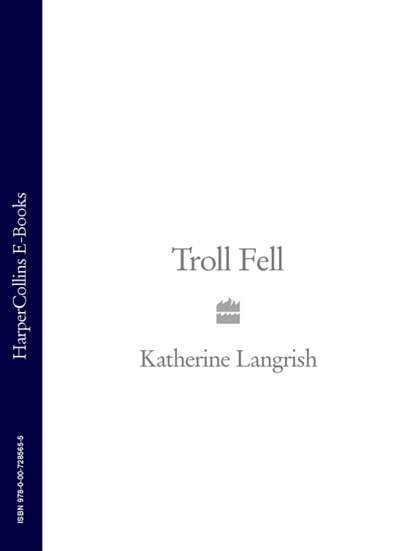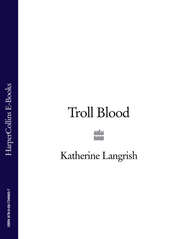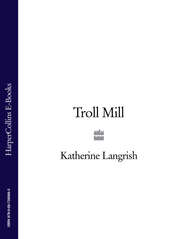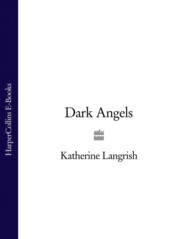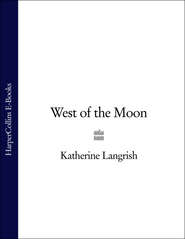По всем вопросам обращайтесь на: info@litportal.ru
(©) 2003-2025.
✖
Troll Fell
Настройки чтения
Размер шрифта
Высота строк
Поля
Soot showered into the fire. Alf, the old sheepdog, pricked his ears uneasily. Up on the roof the troll lay flat with one large ear unfurled over the smoke hole. Its tail lashed about like a cat’s, and it was growling. But none of the humans noticed. They were too wrapped up in the story. Ralf wiped his face, his hand trembling with remembered excitement and laughed.
“I daren’t go home,” he continued. “The trolls would have torn your mother and Hilde to pieces!”
“What about us?” shouted Sigrid.
“You weren’t born, brats,” said Hilde cheerfully. “Go on, Pa!”
“I had one chance,” said Ralf. “At the tall stone called the Finger, I turned off the road on to the big ploughed field above the mill. The pony could go quicker over the soft ground, you see, but the trolls found it heavy going across the furrows, and I guess the clay clogged their feet. I got to the millstream ahead of them, jumped off and dragged the pony through the water. There was no bridge then. I was safe! The trolls couldn’t follow me over the brook.”
“Were they angry?” asked Sigurd, shivering.
“Spitting like cats and hissing like kettles!” said Ralf. “They threw stones and clods at me, but it was nearly daybreak and off they scuttled up the hillside. The pony and I were spent. I staggered over to the mill and banged on the door. They were all asleep inside, and as I banged again and waited I heard – no, I felt, through the soles of my feet, a sort of far-off grating shudder as the top of Troll Fell sank into its place again.”
He stopped thoughtfully.
“And then?” prompted Hilde.
“The old miller, Grim, threw the door open swearing. What was I doing there so early, and so on – and then he saw the golden cup. His eyes nearly came out on stalks. A minute later he couldn’t do enough for me. He kicked his sons out of bed, made room for me by the fire, sent his wife running for ale and bread, and it was ‘Toast your feet, Ralf, and tell us what happened!’”
“And you did!” said Gudrun grimly.
“Yes,” sighed Ralf, “of course I did. I told them everything.” He turned to Hilde. “Fetch down the cup, Hilde. Let’s look at it again.”
Up on the roof the troll got very excited. It skirmished round and round the smoke hole, like a dog trying to see down a burrow. It dug its nails deep into the sods and leaned over dangerously, trying to get an upside-down glimpse of the golden goblet which Hilde lifted from the shelf and carried over to her father.
“Lovely!” Ralf whispered, tilting it. The bowl was wide. Two handles like serpents looped from the rim to the foot. The gold shone so richly in the firelight, it looked as if it could melt over his fingers like butter. Ralf stroked it gently, but Gudrun tightened her lips and looked away.
“Why don’t we ever use it?” asked Sigrid admiringly.
“Use that?” cried Gudrun in horror. “Never! It’s real bad luck, you mark my words. Many a time I’ve asked your father to take it back up the hill and leave it. But he’s too stubborn.”
“It’s so pretty,” said Sigrid. She stretched out to touch it, but Gudrun smacked her hand away.
“Gudrun!” Ralf grumbled. “Always worrying! Who’d believe my story without this cup? My prize, won fair and square! Bad luck goes to people with bad hearts. We have nothing to fear.”
“Did the old miller like it?” asked Sigurd.
“Oh yes,” said Ralf seriously. “‘Troll treasure!’ said old Grim, ‘We could do with a bit of that, couldn’t we, boys?’ I began to feel uncomfortable. After all, nobody knew where I was. I got up to go – and there were the two boys in front of me, blocking the door, and old Grim behind me, picking up a log from the woodpile!”
Hilde whistled.
“There I was,” said Ralf, “and there was Grim and his boys, big lads even then! I do believe there would have been murder done – if it hadn’t been for Bjørn and Arnë Egilsson who came to the door at that moment with some barley to grind. Yes, I might have been knocked on the head for that cup.”
“And that’s why the millers hate us?” asked Hilde, pleased at her success in changing the subject. “Because you’ve got the cup and they haven’t?”
“There’s more to it than that,” said Gudrun. “Old Grim was crazy to have that cup, or something just like it. He came round pestering your father to show him the exact spot on the fell where he saw all this. Wanted to dig his way into the hill.”
“Old fool!” Ralf growled. “Dig his way into a nest of trolls?”
“We said no, and wished him good riddance,” said Gudrun. “But next day he was back. Wanted to buy the Stonemeadow from your father and dig it up!”
“I turned him down flat,” said Ralf. “‘If there’s any treasure up there,’ I told him, ‘it belongs to the trolls and they’ll be guarding it. I won’t sell!’”
“Now that was sense!” said Gudrun. “But what happened? Next day, old Grim’s telling everyone who’ll listen that Ralf’s cheated him – taken the money and kept the land!”
“A dirty lie!” said Ralf, reddening.
“But old Grim’s dead now, isn’t he?” asked Hilde.
“Oh yes,” said Ralf, “he died last winter. But you know why, don’t you? He hung about on that hill in all weathers, searching for the way in, and he got caught in a snowstorm. His two sons went searching for him.”
“I’ve heard they found him lying under the crag, clawing at the rocks,” added Gudrun. “Weeping that he’d found the gate and could hear the gatekeeper laughing at him from inside the hill! They carried him back to the mill, but he was too far gone. They blame your father for his death, of course.”
“That’s not fair!” said Hilde.
“It’s not fair,” said Gudrun, “but it’s the way things are. Which makes it madness for your father to be thinking of taking off on a foolhardy voyage and leaving me to cope with it all.”
Hilde groaned inwardly. Now the quarrel would begin all over again!
“Ralf,” Gudrun begged. “You know these trips are a gamble. Ten to one you’ll make no profit!”
Ralf scratched his head uncomfortably. “It’s not just for profit,” he tried to explain. “I want – I want some adventure, Gudrun. All my life I’ve lived here, in this little valley. I want—” he took a deep breath, “new skies, new seas, new places!” He looked at her pleadingly. “Can’t you see?”
“All I can see,” Gudrun flashed, “is that you’re throwing good money after bad, for the sake of a selfish pleasure trip!”
Ralf went scarlet. “If the money worries you, sell this!” he roared, seizing the golden cup and brandishing it at her. “It’s gold, it will fetch a fine price, and I know you’ve always hated it! There’s security for you! But I’m sailing on that longship!”
“You’ll drown!” sobbed Gudrun. “And all the time I’m waiting and waiting for you, you’ll be riding over Hel’s bridge with the rest of the dead!”
There was an awful silence. The little ones stared with big, solemn eyes. Hilde bit her lip. Eirik coughed nervously and took a cautious spoonful of his cooling groute. Ralf put the cup quietly down and took Gudrun by the shoulders. He gave her a little shake and said gently, “You’re a wonderful woman, Gudrun. I married a grand woman, sure enough. But I’ve got to take this chance of going a-Viking!”
A gust of wind buffeted the house. Draughts crept and moaned through cracks and crannies. Gudrun drew a deep, shaky breath.
“When do you go?” she asked unsteadily. Ralf looked down at the floor.
“Tomorrow morning,” he admitted in a low voice. “I’m sorry, Gudrun. The ship sails tomorrow.”
“Tomorrow?” Gudrun’s lips whitened. She turned her face against Ralf ’s shoulder and shuddered. “Ralf, Ralf!” she murmured. “It’s no weather for sailors!”
“This will be the last of the spring gales,” Ralf consoled her.
Up on the roof the troll lost interest in the conversation. It sat riding the ridge, waving its arms in the wind, and calling loudly, “Hoooo! Hututututu!”
“How the wind shrieks!” said Gudrun, and she took the poker and stirred up the fire. A stream of sparks shot up through the smoke hole. The startled troll threw itself into a backwards somersault and rolled down off the roof, landing on its feet in the muddy yard. Then it prowled inquisitively round the buildings, leaving odd little eight-toed footprints in the mud. The farmhouse door had a horseshoe nailed over it. The troll tutted and muttered, and made a detour around it. But it went on, prying into every corner of the farmyard, leaving smears of bad luck, like snail-tracks, on everything it touched.
CHAPTER 3
Talking to the Nis





